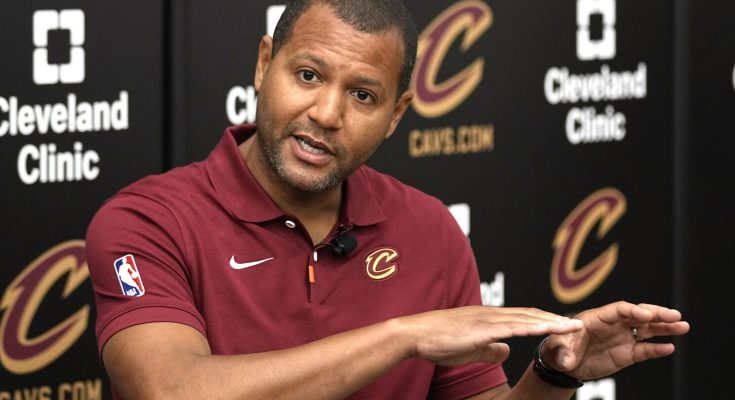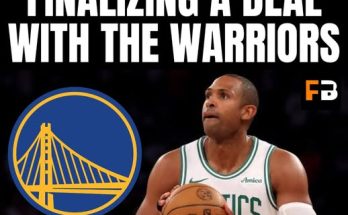Kevin Love’s journey through the NBA has been one marked by brilliance, sacrifice, personal transformation, and a quiet, enduring resilience. When he returned to Rocket Mortgage FieldHouse in Cleveland, the ovation he received was not merely a nod to his past achievements—it was a declaration of enduring appreciation, a moment of reflection on how deeply he had embedded himself into the soul of Cleveland basketball. The warmth, the cheers, and the emotion in that arena reminded everyone that while time moves forward and teams evolve, legacies—when built on authenticity and heart—remain untouched.
When Kevin Love was traded to the Cleveland Cavaliers in 2014, he was the final piece of a championship puzzle. Joining forces with LeBron James and Kyrie Irving, the expectation wasn’t just to contend—it was to deliver a title to a city starving for one. Love’s initial years in Cleveland were filled with scrutiny. As the third wheel in a superstar trio, his game was dissected, often undervalued, and sometimes misunderstood. His role morphed from dominant double-double machine in Minnesota to floor-spacing big man in Cleveland. He sacrificed touches, stats, and spotlight, all for the greater good. Yet in the eyes of many, he was expendable. But the championship run in 2016, particularly his crucial stop on Stephen Curry in Game 7, changed everything. That moment—arms outstretched, shuffling with desperation and determination—became the defining image of Kevin Love’s career in Cleveland. It wasn’t flashy. It wasn’t highlight-reel worthy. But it was everything Cleveland stood for: grit, sacrifice, and heart.
When Love made his return to Cleveland recently as a member of the Miami Heat, that singular image came rushing back for fans. Time had passed. The roster had turned over. The Cavaliers were a young, rebuilding team again, trying to forge a new identity. But Kevin Love walking onto that floor brought back an emotional wave that reminded everyone of what once was—and what still lingers. The applause wasn’t just for his basketball acumen. It was for his character. It was for the way he embraced the city, spoke openly about his battles with mental health, and stayed loyal during turbulent post-LeBron years.
Love never asked out. When LeBron James left for Los Angeles in 2018, Love could have easily sought a trade, and many expected him to. But he didn’t. He signed an extension, opting to help lead a young Cavs team that had no clear future. That decision said more about Love’s integrity than any box score ever could. He chose Cleveland even when the spotlight dimmed. That kind of loyalty resonates in a city like Cleveland. A blue-collar town, proud and passionate, where sports are woven into the very identity of its people, respects those who stay when it’s tough, who show up when it’s thankless.
Even through injuries and coaching changes, Love remained a pillar in the locker room. His leadership evolved from being a contributor to being a mentor. He encouraged Darius Garland, Collin Sexton, and later Evan Mobley and Isaac Okoro. He transitioned from being the guy to the guy who helps others become the guy. And when he did eventually move on, it wasn’t with bitterness or drama. It was mutual. Respectful. A quiet farewell to a chapter that had run its course, but one both sides knew was deeply meaningful.
When Love walked back into Rocket Mortgage FieldHouse, it wasn’t as a visitor. It was as family. The arena rose not because of nostalgia, but because of impact. Fans held signs. Chants broke out. His former teammates embraced him. Tears weren’t far behind. And in that moment, Kevin Love’s legacy was no longer just about Game 7 or All-Star appearances—it was about the intangible legacy he had left behind in the city’s basketball culture.
The NBA often moves quickly, and loyalty is a rare currency. Players are judged by numbers and rings. But sometimes, a legacy is more about presence than performance. It’s about how you carry yourself during adversity, how you treat a city when you’re no longer the centerpiece, and how you evolve without bitterness. Love’s willingness to speak up about his mental health challenges, particularly during the 2017-2019 seasons, changed the discourse in professional sports. He became a leading voice in destigmatizing depression and anxiety, sharing his story in a vulnerable essay for The Players’ Tribune that echoed across the sports world. Cleveland didn’t just embrace his words—they connected with them.
That connection strengthened his bond with the city beyond the basketball court. For many fans, Kevin Love became a symbol of honesty, resilience, and grace under pressure. He helped redefine what leadership looks like. It wasn’t always loud. It wasn’t always easy. But it was always authentic.
On the night of his return, Love took time to acknowledge the fans. He looked around the arena, clearly moved. His postgame remarks were filled with genuine appreciation. He spoke about his time in Cleveland with reverence, calling it the most formative years of his career. “This city,” he said, “taught me how to love the game again. How to appreciate the grind. How to show up every day for something bigger than myself.” Those words weren’t just a media soundbite. They were a tribute to a city that shaped him as much as he shaped it.
His performance on the court that night was solid, but it almost didn’t matter. The real impact was emotional, not statistical. The standing ovation before tip-off, the tribute video, the crowd’s chants—it all crystallized the truth that Kevin Love is, and will always be, a Cleveland Cavalier in spirit. And in an era where player-team relationships are often transactional, this bond felt refreshingly genuine.



